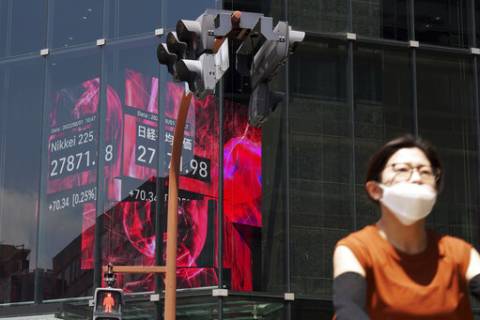BANGKOK (AP) — Shares were mostly higher in Asia on Monday after a strong close on Wall Street last week, though the latest manufacturing surveys showed weakening factory activity in the region’s biggest economies.

Tokyo, Shanghai and Sydney advanced while Hong Kong and Seoul slipped. U.S. futures declined and oil prices lost more than $1 a barrel.
On Friday, Wall Street closed out its best month since November 2020. The S&P 500 index, a benchmark for many stock funds, rose 1.4% and finished 9.1% higher for July.
A rebound in technology stocks, big retailers and other companies that rely on direct consumer spending helped drive broad gains in July, though the index is still down 13.3% for the year.
Tokyo's Nikkei 225 index gained 0.5% to 27,948.50 while the Shanghai Composite index edged 0.2% higher, to 3,258.46. In Sydney, the S&P/ASX 200 rose 0.4% to 6,972.80. The Kospi in Seoul shed 0.1% to 2,448.47 and Hong Kong's Hang Seng gave up 0.3% to 20,091.11.
Chinese manufacturing’s recovery from anti-virus shutdowns faltered in July as activity sank, a survey showed Sunday, adding to pressure on the struggling economy in a politically sensitive year when President Xi Jinping is expected to try to extend his time in power.
Factory activity was depressed by weak global demand and anti-virus controls that are weighing on domestic consumer spending, according to the national statistics agency and an official industry group, the China Federation of Logistics & Purchasing.
A similar survey of purchasing managers, the au Jibun Bank Japan Manufacturing PMI, slipped to 52.1 in July from 52.7 in June, the slowest growth in the sector in 10 months, as costs of energy and labor rose. The survey measures various components on a scale up to 100, with readings above 50 indicating expansion.
Investors in the region will be getting a new installment of updates on corporate results this week. Wall Street's latest rally came as investors weighed a mix of company earnings reports and new data showing inflation jumped by the most in four decades last month.
The tech-heavy Nasdaq rose 1.9%, ending the month 12.4% higher, while the Dow Jones Industrial Average rose 1% and notched a 6.7% gain for the month. The Russell 2000 rose 0.7%, ending July with a 10.4% gain.
Weak economic data, including a report Thursday showing that the U.S. economy contracted last quarter and could be in a recession, have also spurred stocks higher by giving some investors confidence that the Federal Reserve will be able to dial back its aggressive pace of rate hikes sooner than expected.
The central bank raised its key short-term interest rate by 0.75 percentage points on Wednesday, lifting it to the highest level since 2018. The Fed is raising rates in a bid to slow the U.S. economy and quell inflation.
An inflation gauge that is closely tracked by the Federal Reserve jumped 6.8% in June from a year ago, the biggest increase in four decades, leaving Americans with no relief from surging prices. On a month-to-month basis, inflation accelerated to 1% in June from May’s 0.6% monthly increase, the Commerce Department said Friday.
In Europe, inflation surged in July, hitting 8.9% in the 19 European countries that use the euro currency.
In other trading, U.S. benchmark crude oil lost $1.31 to $97.31 per barrel. It jumped $2.20 to $98.62 on Friday. Brent crude oil, the basis for pricing international oils, lost $1.04 to $102.93 per barrel.
The U.S. dollar fell to 132.48 Japanese yen from 133.25 yen. The euro rose to $1.0228 from $1.0223.
___
